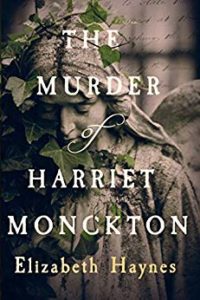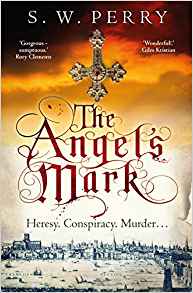 Two historical thrillers published this year which I have enjoyed reading recently are The Murder of Harriet Monckton by Elizabeth Haynes (Myriad, 2018) and The Angel’s Mark by S.W.Perry (Corvus, 2018). They are very different.
Two historical thrillers published this year which I have enjoyed reading recently are The Murder of Harriet Monckton by Elizabeth Haynes (Myriad, 2018) and The Angel’s Mark by S.W.Perry (Corvus, 2018). They are very different.
The Murder…. is based on a real case, the death of the eponymous Harriet Monckton and her unborn child in 19th century Bromley, then a small town in Kent. So it has drawn comparison with Kate Summerscale’s 2009 best-seller, The Suspicions of Mr Whicher (Bloomsbury) also based on a real crime, but this is misleading. I enjoyed reading Mr Whicher, which was as much the story of the police detective, a profession relatively recently added to the 19th century public consciousness, and his difficulties in an essentially class-bound society, as the story of the actual, unsolved, case. The Murder of Harriet Monckton, however, is a much more complex novel, told in the multiple voices of the citizens of Bromley, based on their people witness statements as well as the coroner’s report ( the Home Secretary was also involved ).
Haynes expertly recreates the life of the small market town, with its tradesmen, artisans, gentry and professionals. its internal divisions and dissensions (not least the religious ones). Each voice belongs to someone either of the town or connected with the deceased elsewhere. Each knows her very well, or at least they think they do. All react to the death and the subsequent inquest – which went on for two years – and all have their reasons for wanting her dead. The hypocrisies of 19th century provincial life are exposed, the shallow piety of church and chapel and the perilous position of the unmarried woman. The community is shocked and disturbed by the event as it seeks to apportion blame, look for a culprit and scapegoat so as deflect suspicion from themselves. And, over time, as the memory of Harriet fades she takes on a different persona entirely.
This is a rich, dark and elaborate novel which examines the human heart in all its complexity.

The second book, Angel’s Mark is less complex and very much in the mould of historical detective stories, such as C.J.Sansom’s Shardlake or Lindsey Davis’ Falco. If you like these ( and I enjoy reading them ) you will enjoy S.W.Perry’s debut novel. Our hero Nicholas Shelby, is a physician in Elizabethan England, who sets himself the task of tracking down a serial killer. The problem is that the killer’s victims are, by and large, the flotsam of society, the deformed or mentally ill and the watch, the only local law are unimpressed. Nicholas has his own demons, having failed to save his beloved wife from disease, despite all his learning.
All this is set within the context of the increasing factionalism, suspicion and fear of Elizabeth’s so-called ‘second reign’, after the death of most of the ministers – Leicester, Walsingham, Hatton – who served her from her accession ( Burghley being the exception ). The court was rife with rivalries and plots which rippled out into society and Shelby too gets enmeshed. It’s a rip-roaring read and Perry paints a very convincing picture of Elizabethan London life. Definitely one for the Autumn break luggage.
For more fiction recommendations try Short Stories Novels Historical Two Novels Historical Naval Novels


 RSS – Posts
RSS – Posts